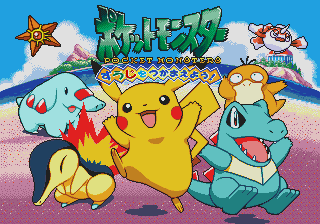Difference between revisions of "Pocket Monsters: Suuji o Tsukamaeyou!"
From Sega Retro
m |
|||
| (11 intermediate revisions by 7 users not shown) | |||
| Line 1: | Line 1: | ||
{{Bob | {{Bob | ||
| bobscreen=PMSoT title.png | | bobscreen=PMSoT title.png | ||
| − | |||
| − | |||
| publisher=[[Sega Toys]] | | publisher=[[Sega Toys]] | ||
| − | | developer= | + | | developer=[[Arc System Works]]{{ref|[http://gdri.smspower.org/wiki/index.php/Arc_System_Works GDRI] (as mentioned in Arc System Works 25th Anniversary Official Character Collection)}} |
| + | | licensor=[[The Pokémon Company]], [[Nintendo]], [[Creatures]], [[Game Freak]], [[TV Tokyo]], ShoPro, JR Kikaku | ||
| system=[[Sega Pico]] | | system=[[Sega Pico]] | ||
| − | |||
| sounddriver= | | sounddriver= | ||
| peripherals= | | peripherals= | ||
| Line 12: | Line 10: | ||
| genre=Educational | | genre=Educational | ||
| releases={{releasesPico | | releases={{releasesPico | ||
| − | | pico_date_jp=2002-08 | + | | pico_date_jp=2002-08 |
| − | | pico_code_jp=HPC-6113 | + | | pico_code_jp=HPC-6113 |
| pico_rrp_jp=3,980 | | pico_rrp_jp=3,980 | ||
}} | }} | ||
}} | }} | ||
| − | {{sub-stub}}'''''{{PAGENAME}}''''' (ポケットモンスター すうじをつかまえよう!) is a [[Sega Pico]] game | + | {{sub-stub}}'''''{{PAGENAME}}''''' (ポケットモンスター すうじをつかまえよう!) is a [[Sega Pico]] children's educational game developed and published by [[Sega Toys]]. Based on the highly-popular [[Creatures]]/[[Game Freak]]/[[Nintendo]] role-playing game series ''[[wikipedia:Pokémon|Pokémon]]'', it was released exclusively in Japan in August 2002, and is most notable for being the first entry in the titular series to be released on a [[Sega]] home video game system. |
| − | ==Physical | + | ==Physical scans== |
{{Scanbox | {{Scanbox | ||
| console=Pico | | console=Pico | ||
| Line 29: | Line 27: | ||
}} | }} | ||
| − | {{ | + | ==Technical information== |
| + | {{mainArticle|{{PAGENAME}}/Technical information}} | ||
| + | |||
| + | ==References== | ||
| + | <references/> | ||
| + | |||
{{Pokemon}} | {{Pokemon}} | ||
Latest revision as of 17:21, 5 May 2023
| Pocket Monsters: Suuji o Tsukamaeyou! | ||||||||||
|---|---|---|---|---|---|---|---|---|---|---|
| System(s): Sega Pico | ||||||||||
| Publisher: Sega Toys | ||||||||||
| Developer: Arc System Works[1] | ||||||||||
| Licensor: The Pokémon Company, Nintendo, Creatures, Game Freak, TV Tokyo, ShoPro, JR Kikaku | ||||||||||
| Genre: Educational | ||||||||||
| Number of players: 1 | ||||||||||
|
This teeny-tiny article needs some work. You can help us by expanding it.
Pocket Monsters: Suuji o Tsukamaeyou! (ポケットモンスター すうじをつかまえよう!) is a Sega Pico children's educational game developed and published by Sega Toys. Based on the highly-popular Creatures/Game Freak/Nintendo role-playing game series Pokémon, it was released exclusively in Japan in August 2002, and is most notable for being the first entry in the titular series to be released on a Sega home video game system.
Physical scans
Technical information
- Main article: Pocket Monsters: Suuji o Tsukamaeyou!/Technical information.
References
| Print Club Pokémon B (1999) | Pokémon Corogarena (2022) | |
| Pocket Monsters Suuji o Tsukamaeyou! (2002) | Pocket Monsters Advanced Generation Hiragana Katakana Kakechatta! (2004) | Pocket Monsters Advanced Generation Minna de Pico Pokémon Waiwai Battle! (2004) | |
| Pocket Monsters Advanced Generation Pokémon Suuji Battle!! (2005) | Chiiku Drill Pocket Monsters Diamond & Pearl: Moji Kazu Chie Asobi (2007) | Pocket Monsters Diamond & Pearl Pokémon o Sagase! Meiro de Daibouken! (2009) | Pocket Monsters Best Wishes! Chinou Ikusei Pokémon Daiundoukai (2010) | |
| Unlicensed Pokémon games for Sega systems | |
| Pocket Monster (1999) | Pokemon Stadium (2000) | Pocket Monster II (2001) | Pokemon Crazy Drummer (2002) | Pokémon II (2002) | |

